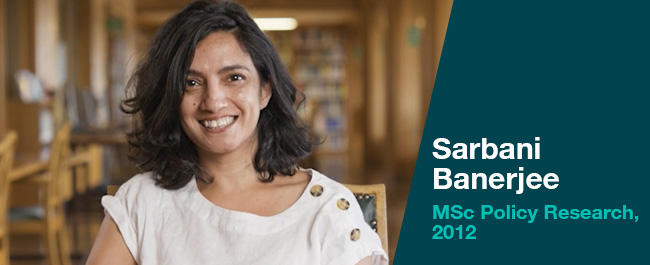Sarbani Banerjee
Sarbani graduated from MSc Policy Research in 2012, and has since been working in education policy

What led you to postgraduate study?
I started to realise that I had some gaps in my knowledge, and a lot of people around me had also started to think about doing further study. I looked around to think about what might be the right course for me in the industry that I worked in and what would ensure me to stay employable in the next couple of years.
What did you enjoy most about your master's?
What I enjoyed most about studying at master's level was an introduction to a wider range of theories than I had ever come across before. I started as a history student, and social science was a new world for me. Alongside that, I met some really interesting people from other industries who were also looking to develop their policy expertise.
What have you done since your master's?
My career path since studying has been very much focused on working in education policy. When I started the master's, I was already working in a policy role. Completing the programme enabled me to think about working in policy areas I'd not really thought about before, so I then moved on to a number of higher education policy roles. I'm currently a senior strategy advisor working on areas of bullying and harassment in research and innovation.
What professional skills did you learn from your master's?
Doing a master's has helped my career in a number of ways. The most direct impact was when I went into interviews, I had some very tangible experience and knowledge, and I could demonstrate the sorts of competencies that the employer was looking for. More generally, I think the knowledge base that I developed and the ability to critique some of the approaches in policy was really helpful.
How did your master's help with your career progression?
The course was really helpful in helping me to think about my own career progression. Sometimes when you're in work, you often just focused on the deadlines and you don't have the chance to step back and think about where you're going or even to experiment with doing things differently. The time on the course, just taking a couple of days out every month, definitely gave me space for that.
So, if someone's considering doing a master's, while they're working, and perhaps they've got some reservations about whether they can fit things in them, I definitely say think about it because there are options for flexible learning and tutors are often very supportive, enabling you to adapt some of the time studying as well.
